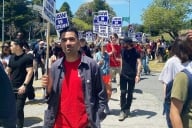You have /5 articles left.
Sign up for a free account or log in.
The Supreme Court on Monday announced that it will rule on whether enterprising re-sellers can hawk cheaper versions of textbooks, produced for students overseas, to U.S. students at a discount.
The High Court granted a writ of certiorari to John Wiley & Sons, Inc. v. Supap Kirtsaeng -- a case that pits a big-time textbook publisher against an enterprising graduate student and could have major implications for how much publishers charge for their textbooks, both in the United States and abroad. As is the court's standard practice, it offered no comment in agreeing to hear the case.
The lawsuit dates to 2008 when Wiley took Kirtsaeng, then a doctoral student in mathematics at the University of Southern California, to court for allegedly obtaining cheaply made foreign editions of the publisher’s textbooks and selling them to his American peers at a markup, possibly making around $1 million from the scheme in a single year.
The publisher says that Kirtsaeng arranged for friends and family in his native Thailand to ship him versions of textbooks manufactured on the cheap -- with different paper and bindings and fewer colors and graphics -- by Wiley’s Asian division to sell in countries where students tend to be poorer than their American counterparts. (The substantive content of the editions is the same.) Kirtsaeng would then sell the cheaper versions on eBay, reimbursing his collaborators and keeping the profit.
Kirtsaeng purportedly hatched the scheme to help pay for his schooling, although the budding academic may have made between $900,000 and $1.2 million in revenues between sometime in 2007 -- when he began re-selling the foreign editions -- and September 2008, when Wiley got an injunction against him, according to court documents. Kirtsaeng said he was unaware that he had committed a crime, having sought legal counsel from Google Answers, an online forum where users can seek advice from strangers. great line. dl***Thx./sk***
A district court jury nevertheless decided that Kirtsaeng had willfully violated the publisher’s copyright and asked the Thai emigrant to pay Wiley $600,000 in damages.
Kirtsaeng appealed the decision under the auspices of the “first sale doctrine,” a provision that says copyright holders can influence the price at which their work is sold only once. After that, the purchaser is free to sell a copyrighted work for as much as he can get, according to the doctrine.
The doctrine, which is part of the U.S. Copyright Act of 1976, says that the owner -- e.g., Kirtsaeng -- of a “particular copy” of a copyrighted work -- e.g., a textbook -- that has been “lawfully made under this title, or any person authorized by such owner, is entitled, without the authority of the copyright owner” -- e.g. Wiley -- “to sell or otherwise dispose of the possession of that copy.” steve -- very nicely explained. dl***Thx./sk***
The question that the courts have grappled with is what to make of the phrase, “lawfully made under this title.” Does it mean manufactured lawfully in the United States? Or does it mean manufactured lawfully under U.S. copyright law, whether within U.S. borders or without?
In August 2010, the United States Court of Appeals for the Second Circuit chose the former interpretation, affirming the district court’s decision for Wiley. Kirtsaeng appealed the case to the Supreme Court, which granted him a writ of certiorari on Monday.
Déjà Vu
The Supreme Court last year was divided by a case that held similar implications. In Costco Wholesale Corporation v. Omega, S.A., the Supreme Court upheld a lower court ruling that Costco could not sell Omega watches -- obtained cheaply via intermediaries from “gray market” sources abroad -- in California for less than the watchmaker itself was selling them in the United States.
Although the Costco case did not deal directly with textbooks, the Association of American Publishers filed an amicus brief with the High Court, asking the justices to rule in favor of Omega.
“Copies of foreign editions [of textbooks] would be imported en masse, by large campus-based bookstores, Internet resellers, and others,” the association wrote. “The loss of revenue from domestic editions would drastically reduce the ability of publishers to compensate authors for their work and lead to significant changes in the publishers’ business models which, in turn, will cause ripple effects beyond the publishing industry.”
To the publishers’ relief, the case fell for Omega, although just barely. The justices were split, 4-4, with one abstention, therefore upholding an earlier ruling -- by the U.S. Court of Appeals for the Ninth Circuit -- in favor of Omega. The abstaining judge was Justice Elena Kagan, who, prior to her nomination to the Supreme Court, had filed a pro-Omega brief during her tenure as solicitor general of the United States.
The Wiley v. Kirtsaeng case could prove to be a nail-biter for the publishers. In their 2-1 ruling, the prevailing 2nd Circuit appellate judges acknowledged that their ruling -- that the first sale doctrine exempts only copyrighted works that are manufactured in the United States -- was “a close call,” and that Wiley’s lawyers may be standing on shakier ground than they think.
“If Congress has intended the first sale doctrine … to apply only to works made in the United States, it could have easily written the statute to say precisely that,” the judges wrote in their decision, calling the law “utterly ambiguous” as written.
The dissenting judge, J. Garvan Murtha, said “the first sale defense should apply to a copy of a work that enjoys United States copyright protection wherever manufactured.” In other words, the sale of each Wiley textbook to Kirtsaeng’s family and friends in Thailand counted as the first sale, leaving Kirtsaeng free to re-sell the textbooks in the United States for whatever price he wished.
“Granting a copyright holder unlimited power to control all commercial activities involving copies of her work would create high transaction costs and lead to uncertainty in the secondary market,” Murtha wrote.
“I agree with the majority that it is a ‘close call,’ ” the judge added, “and I would conclude the first sale doctrine applies to foreign manufactured copies.”
In a post on the official blog of the Association of Research Libraries when Kirtsaeng's first appeal failed eight months ago, copyright lawyer and frequent library advocate Jonathan Band said the Second Circuit court's ruling implied something the Ninth Circuit court did not in Costco v. Omega: that libraries may not be able to lend out foreign-made textbooks without risking running afoul of copyright law.
The Supreme Court is likely to hear arguments in Wiley vs. Kirtsaeng in the term that begins in October and issue a final ruling by June 2013.








